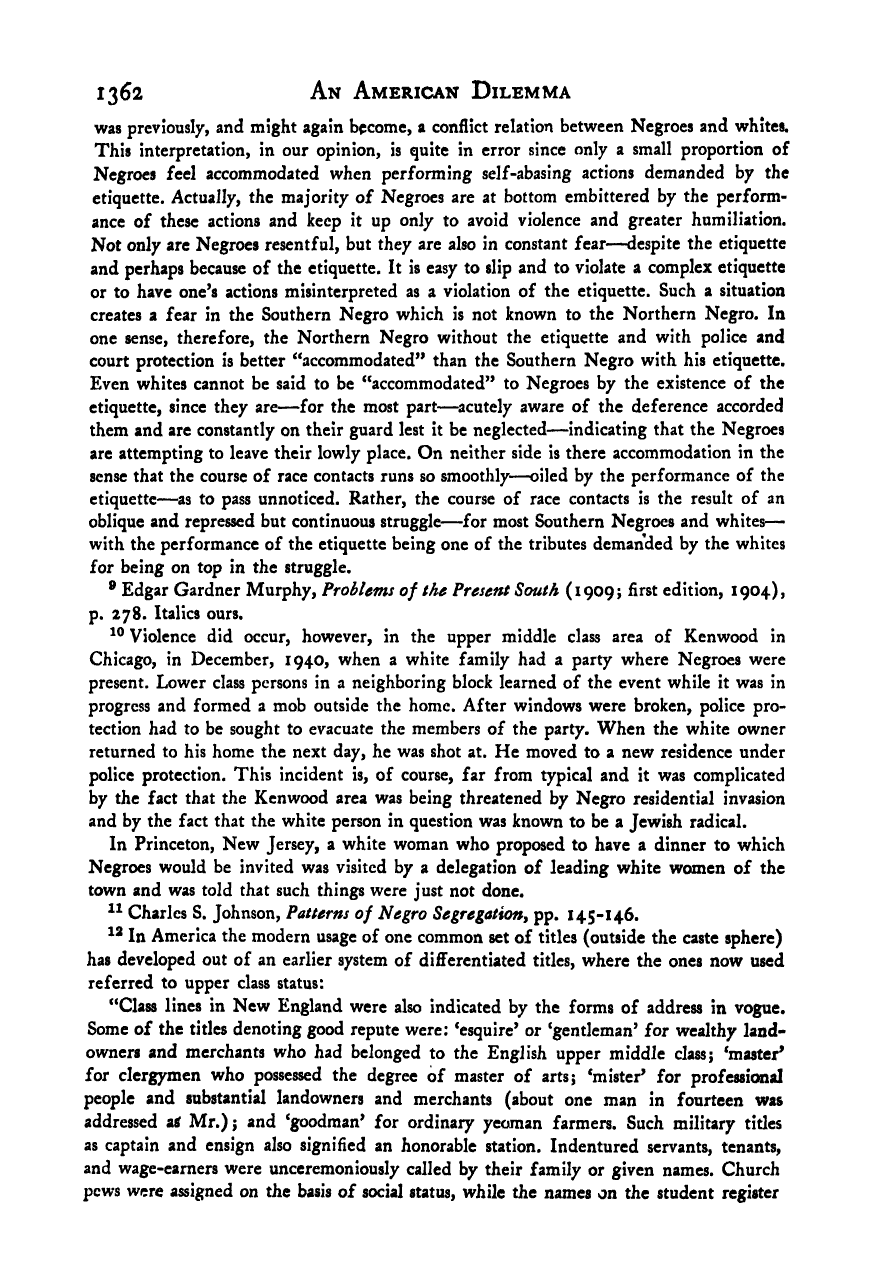Note: Gunnar Myrdal died in 1987, less than 70 years ago. Therefore, this work is protected by copyright, restricting your legal rights to reproduce it. However, you are welcome to view it on screen, as you do now. Read more about copyright.
Full resolution (TIFF) - On this page / på denna sida - Footnotes - Chapter 29

<< prev. page << föreg. sida << >> nästa sida >> next page >>
Below is the raw OCR text
from the above scanned image.
Do you see an error? Proofread the page now!
Här nedan syns maskintolkade texten från faksimilbilden ovan.
Ser du något fel? Korrekturläs sidan nu!
This page has never been proofread. / Denna sida har aldrig korrekturlästs.
1362 An American Dilemma
was previously, and might again become, a conflict relation between Negroes and whites.
This interpretation, in our opinion, is quite in error since only a small proportion of
Negroes feel accommodated when performing self-abasing actions demanded by the
etiquette. Actually, the majority of Negroes are at bottom embittered by the perform-
ance of these actions and keep it up only to avoid violence and greater humiliation.
Not only are Negroes resentful, but they are also in constant fear—despite the etiquette
and perhaps because of the etiquette. It is easy to slip and to violate a complex etiquette
or to have one’s actions misinterpreted as a violation of the etiquette. Such a situation
creates a fear in the Southern Negro which is not known to the Northern Negro. In
one sense, therefore, the Northern Negro without the etiquette and with police and
court protection is better “accommodated” than the Southern Negro with his etiquette.
Even whites cannot be said to be “accommodated” to Negroes by the existence of the
etiquette, since they are—for the most part—^acutely aware of the deference accorded
them and are constantly on their guard lest it be neglected—indicating that the Negroes
are attempting to leave their lowly place. On neither side is there accommodation in the
sense that the course of race contacts runs so smoothly—oiled by the performance of the
etiquette—as to pass unnoticed. Rather, the course of race contacts is the result of an
oblique and repressed but continuous struggle—for most Southern Negroes and whites
with the performance of the etiquette being one of the tributes demanded by the whites
for being on top in the struggle.
® Edgar Gardner Murphy, Problems of the Present South (1909; first edition, 1904),
p. 278. Italics ours.
Violence did occur, however, in the upper middle class area of Kenwood in
Chicago, in December, 1940, when a white family had a party where Negroes were
present. Lower class persons in a neighboring block learned of the event while it was in
progress and formed a mob outside the home. After windows were broken, police pro-
tection had to be sought to evacuate the members of the party. When the white owner
returned to his home the next day, he was shot at. He moved to a new residence under
police protection. This incident is, of course, far from typical and it was complicated
by the fact that the Kenwood area was being threatened by Negro residential invasion
and by the fact that the white person in question was known to be a Jewish radical.
In Princeton, New Jersey, a white woman who proposed to have a dinner to which
Negroes would be invited was visited by a delegation of leading white women of the
town and was told that such things were just not done.
Charles S. Johnson, Patterns of Negro Segregation, pp. 145-146.
In America the modern usage of one common set of titles (outside the caste sphere)
has developed out of an earlier system of diflferentiated titles, where the ones now used
referred to upper class status:
“Class lines in New England were also indicated by the forms of address in vogue.
Some of the titles denoting good repute were: ‘esquire’ or ‘gentleman’ for wealthy land-
owners and merchants who had belonged to the English upper middle class; ‘master’
for clergymen who possessed the degree of master of arts; ‘mister’ for professional
people and substantial landowners and merchants (about one man in fourteen was
addressed asf Mr.); and ‘goodman’ for ordinary yeoman farmers. Such military titles
as captain and ensign also signified an honorable station. Indentured servants, tenants,
and wage-earners were unceremoniously called by their family or given names. Church
pews were assigned on the basis of social status, while the names on the student register
<< prev. page << föreg. sida << >> nästa sida >> next page >>